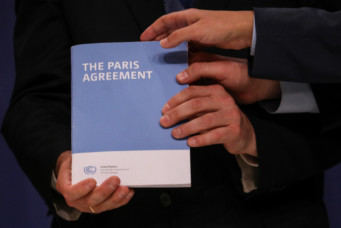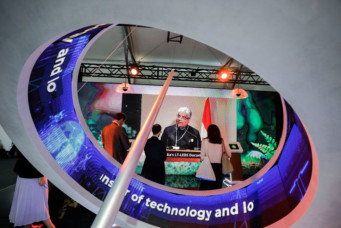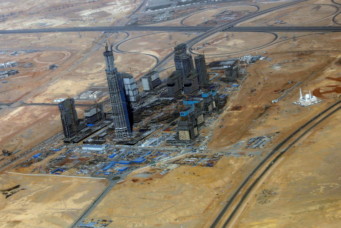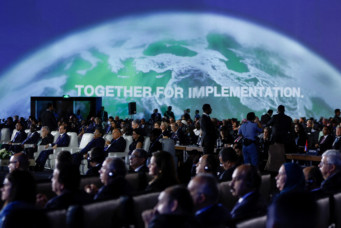Inclusion and Implementation at COP27: Just the Beginning
Achieving a COP of inclusion and implementation….

An attendee poses for a picture near a model of Earth during the COP27 climate summit in Sharm El-Sheikh, Egypt, Nov. 19, 2022. Mohamed Abd El Ghany/Reuters
Hopes were high ahead of the UN’s twenty-seventh Conference of the Parties (COP27) which was branded as the “Implementation COP” because of its potential to put the needs of developing countries center stage and bridge the gap between Global North and Global South countries.
Lack of inclusion, in general, has long been a problem in climate negotiations and policy-making. The burden of responsibility is often disproportionately placed on those who have had the least impact on climate change, yet are the most impacted. This COP, which pledged to transform ideas and previously unfulfilled financial pledges into action, proclaimed a human-centered approach meant to bring about real solutions for the mitigation, adaptation, and relief from the damages inflicted by climate change. Egypt’s Minister of Environment Yasmine Fouad returned to the American University in Cairo after visiting last year while the much-anticipated climate summit was still in planning. Delivering a keynote speech entitled “Egypt and Climate Change—Post COP27,” she was eager to tell audiences “how the story went,” detailing the process of organizing the summit and the particular attention given to inclusion in turning mere ideas into implementable actions.
Preparing for COP27
Fouad explained that before March 2022, Egypt’s plans for dealing with climate change were limited. Organizing COP27 therefore gave Egypt the opportunity to revisit its climate plans and strategies. That process included creating Egypt’s first updated Nationally Determined Contributions, as well as Egypt’s National Climate Change Strategy for 2050, which stated a goal of placing “the quality of life of the Egyptian citizen as a priority” and outlined how different facets of society can play a role in bringing this strategy to life, including the private sector, civil society, women, and academics. To follow that mantra, the road to COP included many collaborations between “the government, the civil society, the youth, the women, and the private sector, in order to prepare for one thing, this is, a COP for implementation”.
Another facet of carving this inclusive road to implementation, she said, was maintaining a human-centered approach. This approach was critical to selecting COP27’s thematic days, which designate the central topics to be discussed during each day of COP. For instance, water was given its own day for the first time, along with other resources such as food and energy. Days were designated based on “who is going to be affected and who is going to affect”—so, alongside holding days for water, food, and energy, other days were dedicated to gender, youth, and civil society. The question of how policy in these sectors would be implemented could then be answered with finance and science-themed days, Fouad added. By framing the thematic days around these pragmatic questions, COP27 was able to set up a strategy for implementation with human needs at the center of the discussion.
Building Momentum for Implementation
Aside from establishing the structure of this COP, Fouad stated that it “was not enough to have the themes and the issues; we wanted to have the momentum”. The minister and her team built momentum in two ways: first through the size of participation. Fouad announced that COP27 included 51,000 participants and 120 heads of state in attendance. She added that the conference also held 168 percent more events than the last three COPs. The second way for building momentum was in the area of negotiations. The agreement to establish a loss and damage fund has been widely regarded as an achievement in COP27.
Fouad emphasized the significance of reaching a decision on the fund, especially for “small island developing states, for the least developed countries, for the most vulnerable countries, for the Africans,” and for countries like the Maldives where “loss and damage is the only survival plan”. Negotiations around a new Adaptation Agenda and around reworking climate finance commitments were also important keystones. These negotiations once again held a particular importance for the countries most vulnerable to climate change, which have long suffered from an adaptation gap—between climate adaptation goals and the actual implementation of adaptation measures due to resource limitations and competing priorities—as well as a lack of commitment follow-through from more developed countries on climate finance.
Fouad attributed success in these areas to the country’s leadership in “framing the discussion, providing an open space for different parties to the convention,” so that it was “not only Egypt” reaching these successes. One way this was done was through the organization of the Green Zone and the Blue Zone. The Green Zone is a space created for the business community, youth, civil and indigenous societies, academia, artists, and fashion communities from all over the world to host exhibitions, workshops, cultural performances, and talks. According to the COP27 website, the Green Zone “promotes dialogue, awareness, education, and commitments”.
The Blue Zone is the UN-managed area designated for negotiations, which can only be accessed by those accredited by the United Nations Framework Convention on Climate Change Secretariat. “We tried as much as we can to have the Green Zone very close to the Blue Zone, because we wanted to make sure that it was an inclusive COP,” said Fouad, also adding that COP27’s Green Zone was three times the size of the Green Zone at COP26 in order to have “the most affected the most heard”. Discussions in the Green Zone were set up to mirror those occurring in the Blue Zone, in an effort to create a “place to discuss, and to open a dialogue and to create and integrate their ideas” for those who “did not have authorization to the Blue Zone”. By including the private sector, civil society, women, academics, youth, and local communities in the Green Zone, Fouad said that they aimed to deliver the message that “climate change is not only an environmental and scientific phenomenon; climate change is the real risk for the one and only planet Earth and that is something that affects every single human being.”
However, many observers condemned the presence of representatives of the oil and gas sector in the Green Zone’s discussions on “Decarbonization Day.” Fouad argued in favor of their inclusion, emphasizing the necessity of giving the space to representatives to “discuss, to make commitments, and to show us how they can be committed”. Nonetheless, this is part of a longstanding discussion among activists and environmentalists that the growing involvement of the fossil fuel lobby overshadows the voices of the most impacted and draws away from important efforts of fossil fuel phaseout. There was further condemnation of COP27’s attendance as many activists struggled to get accreditation and funding amidst prohibitively expensive travel and hotel costs. Young African activists were particularly impacted by COP27’s inaccessibility, a severe detriment to what was hoped to be “the African COP”.
From Ideas to Implementation
In order to build on the momentum established through the inclusive planning process and important negotiations of COP27, Egypt is today working with the United Arab Emirates, which will be hosting COP28 in Dubai at the end of 2023, to support the decisions made at COP27. Fouad reported that leaders are following up on the loss and damage fund: “We’re working on the terms of reference and the scope. We’re working on different committees for implementation.”
Fouad went on to highlight continuing efforts made by her ministry to engage the Egyptian public in climate action now that COP27 is over. By doing so, Egypt hopes to create sustainable solutions that get to the root of the problem through “creation, implementation, new ideas, and job opportunities—and linking that to the economic pathway of this country”. For example, the Ministry of Environment recently established the Green and Climate Investment Unit, which looks at opportunities for small and medium projects from youth and links them to incubators in the private sector. The ministry has also identified potential sectors for programs and employment opportunities that will directly link to Egypt’s mitigation and adaptation efforts, including renewable energy, waste, the bio-based economy, and protected areas. By taking this approach of incorporating climate action into economic opportunity, Fouad hopes for a shift in perspective that will allow people to “look behind climate change,” getting to the roots of the issue and creating sustainable change.
The road to true implementation for the “Implementation COP” may be long and complicated, even with the successes of decisions like the long-awaited loss and damage fund. For implementation to be most effective and to truly move climate action forward, Fouad argued that every voice must be included and that every idea must move off the page and materialize. “COP27 is just the beginning of the road,” she said.
Ana Davis holds a bachelor’s degree in International Affairs from Northeastern University. She is currently pursuing a dual master’s degree in Human Rights and Humanitarian Action from Sciences Po and International Peace and Security from King’s College London.
Read More



